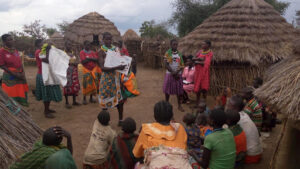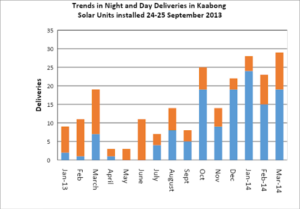
We use cookies to enhance your experience on our website, analyze site usage, and support our marketing efforts. By continuing to browse or by clicking “Accept All,” you agree to our use of cookies.
By Dr. Peter Lochoro
Country Representative
Doctors with Africa CUAMM

Doctors with Africa CUAMM is striving to improve the health of women and children in Africa where we are confronted with many challenges to overcome, ranging from behavioral to input shortage to structural health system challenges. Like many problems in the world, these challenges in health care are multifaceted and require different expertise, skills, capacities, experience and values. Across the world, we all seek partnerships every time we try to address multiple and complex challenges. Bringing together organizations who can contribute with their varied skills, expertise, capacities and experience makes it possible to address the challenges. This is particularly true if we want to address long-term problems in a more sustainable way. There is a proverb, “If you want to go fast, go alone, if you want to go far, go with others.”
CUAMM is working in one of the most difficult regions of Uganda, the region of Karamoja, leading various maternal and child health interventions over the years. Getting mothers to come and deliver in health facilities has been an uphill challenge for years and is a multifaceted problem. In 2013, with support from UNICEF and in partnership with We Care Solar, we instituted a number of innovations to address this challenge. Four key innovations were among the tools deployed. 1) The use of transport vouchers; 2) We Care Solar Suitcases; 3) the Mentor Midwives; and 4) Maternal Child Health (MCH) peer mothers.
 While we had capacity to deploy some of the tools, we needed our partnership with We Care Solar to address the inability for many facilities to conduct deliveries at night. The Solar Suitcase became the magical solution. In terms of installation and operation, it was such a straightforward, low tech device that local technicians were able to manage setup and maintenance. Together, the four innovations contributed to an increase in health facility deliveries from 14,431 in 2013 to 26,560 in 2016.
While we had capacity to deploy some of the tools, we needed our partnership with We Care Solar to address the inability for many facilities to conduct deliveries at night. The Solar Suitcase became the magical solution. In terms of installation and operation, it was such a straightforward, low tech device that local technicians were able to manage setup and maintenance. Together, the four innovations contributed to an increase in health facility deliveries from 14,431 in 2013 to 26,560 in 2016.
The contribution of the Solar Suitcase to overall deliveries was astounding in some districts. For example, in Kaabong district, four health centers received Solar Suitcases and subsequently showed a tremendous increase in total deliveries from an average of nine (9) per month before installation (January to September 2013) to 24 per month in the period after installation (October 2013 to March 2014). This improvement was driven by the large increase in night deliveries from an average of three (3) per month before installation to 18 per month following Solar Suitcase installation. The daytime monthly average deliveries remained unchanged at six (6) deliveries per month. The difference in average monthly total deliveries of 15 (24-9) was all contributed to the increase in night deliveries. The graph below illustrates the significant change. The midwives were extremely delighted with the user-friendly innovation and the mothers expressed overwhelming satisfaction with the improvements in their health facilities.
 The partnership with We Care Solar had a huge impact on our multifaceted problem of low health facility deliveries. We have experienced the power of partnership in accelerating change, managing difficult challenges in less costly, more convenient and sustainable ways.
The partnership with We Care Solar had a huge impact on our multifaceted problem of low health facility deliveries. We have experienced the power of partnership in accelerating change, managing difficult challenges in less costly, more convenient and sustainable ways.
Going forward partnerships should not be an option but a must as long as we live in a world of complex challenges. With good partnerships we derive a 1+1=3 result. I believe that part of the lessons we learned in the field have propelled the energies of our partners to assist many more people in similar difficulties in Africa and should continue to do so. I look forward to more partnerships in the years to come.
2140 Shattuck Avenue, Suite 305
Berkeley, California, 94704 USA
(510) 766-0206
Federal Tax ID#: 30-0627106

We use cookies to enhance your experience on our website, analyze site usage, and support our marketing efforts. By continuing to browse or by clicking “Accept All,” you agree to our use of cookies.